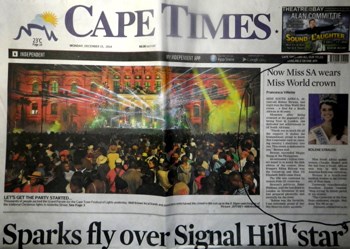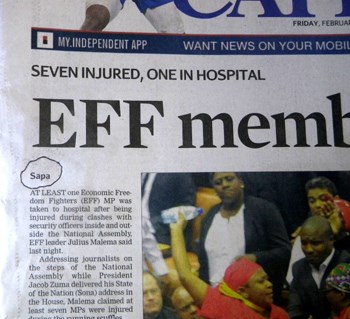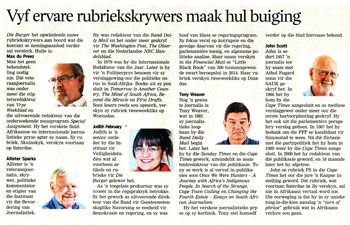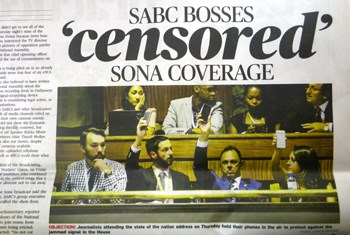"We are unapologetic about our objective to redress the imbalances of the past. This will be reflected in the way we conduct our business, in our recruitment process, in the workplace and in our balanced and fair editorial approach." Iqbal Survé, announcing the return of former Cape Times editor, Ryland Fisher, to Independent Media
It was Jeremy Maggs and the Bizcommunity website that brought home to me the importance of brand and its value and the role of market research in determining that value and monitoring its status.
In all of this, "The customer is king" is an accepted verity and defining who your customer is, normally defines your business plan.
Iqbal Survé has been at the helm of Independent Newspapers for just over a year and, using the Cape Times as a case study, one can see specific trends which prompt the question - who does he and his trusted lieutenants, Karima Brown, Vukani Mde, Gasant Abarder and Aneez Salie, see as their customer?
Here's a letter from Joelene Kesler of Newlands in Cape Town, published in the newspaper on 5 January: "Let's face it, a newspaper gives us yesterday's news today. I enjoy doing your crossword puzzle and reading the 'hatch, match and dispatch' column in your paper.
"However, with your 'dispatch' of John Scott, Alide Dasnois, Tony Weaver, Max du Preez and others, I am not getting what I signed up for. And in this case, less is certainly not more.
"Contractually, I ought not to be bound by my subscription and I am entitled to a refund."
Her concern is understandable. If she renewed an annual subscription at the beginning of last year, it was because she believed that her investment gave her access to columnists who are highly regarded in their field, people with acknowledged expertise who are admired and in some cases revered for their institutional knowledge, people who write with great eloquence. Her life was clearly enriched by their contribution.
Here is a list of columnists to whom her Cape Times subscription no longer gives her access:
• Donwald Pressly
• Anne Crotty
• Terry Bell
• Wendy Knowler
• Peter Wilhelm
• Judith February
• Tyrone August
• John Scott
• Tony Weaver
• Max du Preez
• Allister Sparks
Some left of their own accord because they no longer wished to be associated with the newspaper. Others, such as Peter Wilhelm, Judith February, Tyrone August and John Scott, had their services terminated in two-line emails by Editor Gasant Abarder.
As Abarder pointed out in a letter to Business Day he was compelled to get rid of people like John Scott and Peter Wilhelm, not because readers no longer wanted them as columnists or because they had done anything wrong, but because "... more than 70% of our columnists were white males. How could this be right, when the demographics of this country lie in stark contrast?"
Verwoerdian quotas
That, by any standards, is a startling business plan - somewhat akin to the Mercedes F1 team getting rid of Nico Rosberg, not because he lacks talent, a fan base and market appeal, but because he has blond hair, a Nordic complexion and distinctly Caucasian features. So, does this mean the determining factor for continued employment at the Independent Media newspapers as a columnist (and presumably as an employee) is not necessarily talent, merit, commitment, loyalty, institutional knowledge, mentoring ability, not what the readers and the advertisers they bring with them want, but ethnicity and the racial demographic of the country?
So Abarder hastens to implement Iqbal Survé's "transformation" objectives, gets rid of Scott and Wilhelm and others and then writes an article in which he complains that Helen Zille no longer phones him. Could the reason be that she finds what is being done at Newspaper House is anathema to her as the former Rand Daily Mail journalist who broke the story that Steve Biko had not died of a hunger strike as Jimmy Kruger claimed but had been murdered?
Enoch Godongwana, the man implicated the Canyon Springs pension fund scandal but who retains a senior and influential position in the ANC, fully agrees with Abarder. He says we must return to "Verwoerdian" racial quotas.
Here is what Zille had to say about Godongwana's hopes and aspirations for the country. They are, incidentally, the antithesis, of what people like Nelson Mandela and Trevor Manuel have advocated in the past but they are hopes and aspiration from which the ANC has never distanced itself:
"The ANC's representative in the debate, Enoch Godongwana (who also chairs its transformation committee) agreed. The ANC, he said, would be unapologetic in pursuing 'Verwoerdian' tactics and would 'unashamedly use quotas in every sector of the economy'.
"He seemed unaware that, in our democracy, Verwoerd's methods are both unconstitutional and unlawful. Even the draconian Employment Equity Amendments, currently making their way through Parliament, expressly rule out quotas."
Refugees
Die Burger which has a business plan which is not predicated on and premised upon the ANC's largesse in dispensing tax-payer funded government advertising or the bankrupt Eskom's largesse in dispensing R43 million for Gupta breakfasts, immediately signed up five of the Indy's refugees.
The Cape Times readers and advertisers don't appear to have been consulted regarding these changes. It appears their views are of little consequence to the newspaper's new management and there is no indication that any market research was done to determine what their views are and how they feel about what has happened to a venerable institution that once added value to their lives.
Building trust with customers
If you decide to radically change the product you sell and its brand and managerial ethos, then it would be honest to forewarn your customers so that they can make informed choices about whether they should continue to invest in the new product.
The degree to which the Cape Times has been "transformed" was revealed when Die Burger hit the streets on Christmas Eve last year. Within hours, John Scott's letter had been translated into English and disseminated via social media.
John Scott's column PS is terminated
After a 48-year association with the Cape Times, in a variety of positions, including editor, I was notified a fortnight ago in a two-line email that my weekly column, PS, was being dropped "with immediate effect".
The current editor explained that they were busy "refreshing" contributions by columnists
That is all well and good, even though there are more refined ways of personally communicating this sort of information to someone who has committed virtually his entire professional career to the newspaper
What I find very disturbing, however, is that not only did the newspaper not inform its reading public of the fact that my column would no longer, after many years, be published but that it also refused to publish letters enquiring about the column's absence.
I thus respectfully request that Die Burger (which I have long regarded as an outstanding newspaper,) publish this letter in the interests of all Cape Times readers who understand Afrikaans.
Thank you
John Scott
Claremont
Linked to the governing party
When one compares the front pages each day of Die Burger and the Cape Times one sees a reversal of historical roles. In 1990, Ebbe Dommisse who succeeded Piet Cillié as Editor, informed the National Party that it would no longer serve as its mouthpiece. The newspaper informed its readers that it had broken all ties with the National Party and it dedicated itself to what it called "a broad South Africanism."
Die Burger prior to 1990 was - as mentioned above - a Nat mouthpiece, and now it appears that today's Cape Times in its turn is linked to the governing party and the interests of its readers and conventional news values are subordinated to that imperative.
Take one example of how the Cape Times seems to have abandoned conventional news norms and what is of interest to its traditional readership base. One billion people watched the Miss World competition on the night of Sunday, 14 December last year. South Africans exulted when Rolene Strauss won. To put that in perspective, the last South African woman to win such a title outright was Penny Coelen in 1958 - Anneline Kriel was runner-up to Helen Morgan in the 1974 competition, inheriting the title when Morgan resigned.

Die Burger, being a conventional newspaper, led with the story and devoted much of the front page to it. The Cape Times gave the story a few paragraphs in just two, short columns in the top right corner of the front page. Its lead story was a "social media debate" about an "artwork" incorporating wire from the fencing that once surrounded Robben Island. Die Burger's biggest front-page picture - by far - that morning was Rolene Strauss. On the Cape Times front page it was the smallest.
The Cape Times and SONA
Take another example - SONA... Last Thursday, a statue of Walter and Albertina Sisulu was unveiled in front of parliament and I'll ask a rhetorical question: Would "Shameful Thursday" and the SONA debacle have unfolded as they did if the ANC had not decided to replace their son, Max, as National Assembly Speaker, with Baleka Mbete? The answer is obvious. Sisulu has grace, dignity, gravitas, warmth, style, diplomacy, class, charm, credibility and a political career untainted by scandal. Above all, he has the respect of everyone in parliament.
So when he was replaced by Mbete, it was with a clear political intention - to protect President Jacob Zuma. And, although no one realised at the time just how devastating the consequences would be for our fragile democracy, it was manifestly an event of singular and significant moment and thus very, very newsworthy.
Let me take you back to that event.
Strongest rebuke
In early May last year Lindiwe Mazibuko asked for urgent clarification of a report that Sisulu had been summoned to Luthuli House for the strongest rebuke after he had, to the intense anger of the ANC, allowed an ad hoc committee to be established to investigate President Zuma's role in Nkandla corruption as outlined in the Public Protector's report.
On 20 May, it was confirmed that Sisulu had been succeeded by Baleka Mbete. The die was cast, the "Shameful Thursday" and SONA debacles became ineluctable and the next day - for obvious reasons - Die Burger used the story as its front page lead under the headline, "Sisulu snubbed."
The Cape Times appears to have made no mention at all of the fact that an honest and principled man had been humiliated and, as it transpired, driven out of politics completely - with catastrophic consequences that have further reduced our dwindling status in the eyes of an increasingly concerned international community. Sisulu's ousting was manifestly newsworthy and Die Burger, reflected this in its front-page lead story while its English-language counterpart remained silent.
Politically aligned
One of the characteristics of politically aligned news organisations is that they cannot trust their reporters on stories that reflect badly on the governing party.
The opening sentence in a City Press article "SABC bosses 'censor' SONA Coverage" on Sunday reads: "SABC viewers didn't get to see all of the drama at Thursday night's state of the nation address because news boss Jimi Matthews instructed the TV director not to cut to pictures of opposition parties leaving the National Assembly." There is nothing new in this. According to newspaper reports, when President Zuma was booed at the Nelson Mandela memorial service at the FNB Stadium in Soweto on 10 December 2013, the "struggle journalist" personally phoned individual reporters in the stadium with instructions that they downplay the booing and that was duly reflected in the state broadcaster's television news coverage that night.

The Cape Times, it seems, also cannot trust its reporters in the ANC's moments of travail. As was pointed out in a comment below my analysis of its coverage of Shameful Thursday, it took SAPA for its front-page article on that momentous event - despite having experienced political and parliamentary reporters in its line-up.
This is not what readers like Joelene Kesler of Newlands signed up for when they renewed their subscription to the Cape Times a year ago. If their perception is that they have been ripped off, then one might empathise with that perception.
Clearly, as Peter Bruce points out in the quote that anchors this article, they no longer find in the Cape Times a reflection of the world as they see it. They are not alone.
*Note that Bizcommunity staff and management do not necessarily share the views of its contributors - the opinions and statements expressed herein are solely those of the author."










































